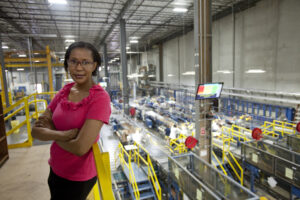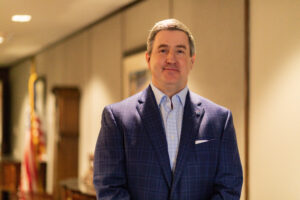Amanda Ellis
Dave Flessner, Business Editor and 39-year veteran of the Chattanooga Times Free Press, has covered Chattanooga business news since the 80s. He reports that he “probably works too much,” but he spends much of his off time with his seven grandchildren all under age 6.
Trend: How did you end up being a journalist?
Flessner: Well, I thought I wanted to be a lawyer, but then I determined America had too many lawyers. I started working in radio, then newspapers and fell in love with being able to ask other people questions. Journalism is fun. Not a day goes by that isn't interesting. I've always been intrigued by business, because all good stories include a struggle to overcome. And every business is in a competitive market, so finding out how they succeed, or fail, and the human struggles to make a business survive and thrive can make a compelling story and offer important lessons on life and business for others. In our work, we enlighten people about the economy and the workplace, and about Chattanooga's opportunities, to help people understand our economy and succeed in it.
Trend: What would you say to people who think reporters are always looking for the negative scoop?
Flessner: People say they want happy news, and to an extent they do. But if you look at the stories that attract the most eyeballs, unfortunately they’re often not happy ones. It's our job to tell stories in a fair, meaningful way. But all the planes that landed safely today aren’t news, even though I’m glad they made it. The plane crashes are the news. But I think it's our job, particularly in business news, to highlight successful businesses doing things right.
Many people right now are convinced the world is going to hell in a handbasket. But from a long term economic perspective, we're actually doing pretty well right now. There are challenges and inequalities, but compared to where we've come from, most people can find jobs. Incomes are going up, and poverty is at its lowest level in more than a decade in Chattanooga. People also have never before had as much access to information and quality healthcare as they do today.
Trend: How did you end up in Chattanooga?
Flessner: I came here in 1980 to work for the newspaper about a week after marrying my wife, who was actually willing to marry me though I was technically unemployed the day we got married. I thought I'd stay maybe six months or a year, not 39 years, but I fell in love with Chattanooga.
As you know, it was quite different here in the 80s. Lots of automotive and heavy industry, companies that closed. We lost population and jobs. Those were compelling stories, I will say, as people struggled to figure it out.
I had opportunities to go to other markets, but I'm glad that I didn't, because this has been both an interesting place to cover and a great place to work. Chattanooga has a wide range of people. You've got an urban environment, the challenges of inner city life, but rural areas at the same time.
Trend: What are the biggest changes you’ve seen in our community?
Flessner: What really united the community in the 80s, even among leadership, was that people's children were moving away. Even if you were successful, your children didn't see the opportunity here at that time. Chattanooga came together in a way that a lot of communities didn't. We have great philanthropic foundations, and people are committed to the community. So we invested in infrastructure like the Riverwalk and the Aquarium, making downtown attractive, parks and the like.
Later, EPB and becoming Gig City spurred innovation. I remember writing about these developments. When the Aquarium opened, the first couple of years, it wasn't this rush of activity. It took time. I remember writing stories the first year or two like, ‘Where's the big payoff people predicted?’ It’s made me more humble as I get older because a lot of times investments don't pay off immediately. Enterprise South, the Tennessee Aquarium, even the Gig didn't pay off for a while. They’re long term investments and that's what Chattanooga has had success with.
Trend: How do you think we still need to grow?
Flessner: Navigating human capital challenges. Many of our jobs won't be here in 15 years or will be much different.
Trucking and logistics have emerged as a fantastic engine of growth here. Look at automated drivers and trucking, and AI. Warehousing and truck driving jobs will be much different in 20 to 30 years. Kids must be better educated than you and I were to compete in the global economy now.
Trend: Thinking back over your career, what have you covered that stands out as impactful?
Flessner: Volkswagen has been a fascinating addition, beyond just jobs and investment. It put us on the international stage. Part of that facility was built on the former Volunteer Army Ammunitions Plant that was built to help fight the Germans in World War II. Now it has attracted Germany’s biggest car company.
Trend: The future of journalism − what do you think it looks like?
Flessner: People have more options to consume news today through technology and social media, which is healthy. The biggest concern I have about the modern consumption of journalism is that people won’t be exposed to unbiased news. We try to approach stories as objectively as we can. But I worry that too many people increasingly end up in an echo chamber of opinions they already have. That's the nature of social media, and I hope that we find ways to break apart from that, so people can be informed and at least know the other side.
Trend: You're saying that today it's easier to consume only information that supports the opinions you already have?
Flessner: Yes, some people might watch Fox News, some people watch MSNBC. I would challenge anyone to watch both for an hour on the same night and you will get a totally different view of the world, even about the same set of events.
Trend: So do you think that print journalism will go away?
Flessner: It’s likely that you won't get the physical product seven days a week at some point in the future, although I think that is still years away here in Chattanooga. Our audience is as big as it's ever been, but more on the digital side than print. A large share of advertising dollars have shifted to that medium. It's great for businesses; they have more opportunities to advertise. We offer great value, but now we have to ask the reader to pay a bigger share of the cost. But I think people value information and if you give them something they need, want and use, it's worth their expense.
If you'd have told me as a child that people would pay $4 for a cup of coffee and they’d pay to watch free television, I'd say you were crazy. But those things have happened.
Trend: Do you moderate comments on social media? What ethical concerns do you deal with in general?
Flessner: We used to allow comments on our online stories. But we quickly determined that within two or three comments, people would gravitate to the negative. And then people would associate biased, negative comments with the story while we strive to be straightforward. On Facebook, there's a limit to what we can monitor. But we check for profanity and libelous statements.
One area of concern in general is information about arrests. We have a team that removes dismissed cases from our website. People aren't usually digging out old newspapers the way they might Google someone, and if you've had an incident years ago, it's likely to show up. We’re conscious of that.
Some believe you shouldn't write anything until someone has been convicted of a crime. But the wheels of justice turn pretty slowly. I think it's a disservice if readers don’t know what's going on.
People don't have to tell us anything if they don't want to. We see that as a fun challenge, because you have to go out and convince people to talk to you, or find a way to get information. But we don’t go undercover to get information or use anonymous sources. Does that mean we don't get some stories? Perhaps. But hopefully what we do get is authentic and reliable.
Trend: How should businesses who want coverage pitch reporters?
Flessner: We're always looking for exciting, different and interesting people, trends, events and businesses. Anyone is welcome to email me ideas ([email protected]). We run all announcements of new businesses in our Sunday Business Digest. We announce management level appointments. Chattanooga in some ways is a big small town, so we help people see what's going on in their community.
Trend: Are there any storylines often pitched to you that aren’t of interest?
Flessner: Company and employee anniversaries that are not significant. 50 or 100 years is extraordinary, but a 15 year employee anniversary, while certainly an accomplishment for that person, doesn’t have broad general appeal. Although, I’ll try to figure out if there's a different angle. A lot of great business stories are out there that people don't tell us about.
Trend: What’s a positive way that technology has changed what you do?
Flessner: Helping us target the news people want. This is frankly an area where newspapers haven’t done the best job. The sports fanatics, people who love local government, someone who loves sewing and knitting or pop culture and local music – what do they want? Social media and web analytics give us feedback on what stories got people's eyeballs, and that’s constructive.







